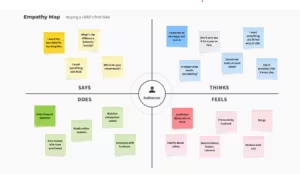Digital experiences are creating innovative paths for people to achieve their goals and alter their behaviors. To help establish new habits, these experiences must engage & retain users, while being thoughtfully designed to ensure a positive impact. As part of the London Design Festival 2024, ustwo and Dezeen co-hosted a panel to explore the latest trends in this field, focusing on effective digital coaching experiences and the role of AI.
Panellists
- Adrien Gomar, Head of Design, L’Oréal
- Suhair Khan, Founder & Director, open-ended
- Greig Robinson, Head of Design, ustwo
- MODERATOR: Benedict Hobson, Co-CEO, Dezeen

Key Takeaways
1. Digital coaching products and experiences must be doable, tunable, and renewable to foster sustainable behavior change.
Doable: Meet users where they are. For example, The Body Coach offers various fitness plans tailored to individual experience levels, breaking down goals into manageable steps to avoid overwhelm.
Tunable: Design experiences that feel highly personalized and relevant. AI-powered solutions can elevate digital coaching by enhancing this customization.
Renewable: Provide users with reasons to return by offering fresh, relevant content. For instance, our collaboration with La Roche-Posay’s acne skincare app, Spotscan+ Coach, delivers new written, audio, and visual content daily from a vast multimedia library.
2. Digital products can enhance the effectiveness of physical habits and items.
A physical product, such as a face moisturizer, may be effective, but users won’t experience its benefits if they don’t use it as intended, says Adrien Gomar. Digital coaching tools that encourage habit adherence ensure these products function as they should.
Similarly, the interaction between digital experiences and users’ real-world habits can significantly impact health. For instance, a digital tool that helps a diabetes patient stay on track with their insulin regimen can positively influence overall wellness and healthcare systems.
3. Incorporate ethics into your product design.
Consider whether your product will have a meaningful impact on people’s lives and behaviors right from the start of the design process, particularly in health-related fields. Anticipate potential issues early to avoid harmful outcomes.
Cross-disciplinary collaboration is essential for developing values-driven digital products, according to Suhair Khan. Involve stakeholders from diverse fields—such as medicine and philosophy—and examine ethical frameworks from established sectors like journalism and law.
4. Achieve the right tone.
When brands design digital experiences for their products, they should consider how a friend might recommend something: by suggesting it, sharing insights, discussing benefits, and offering tips.
Designers must ensure that their products encourage users rather than coerce them.
5. AI can significantly enhance the design of digital experiences aimed at promoting behavior change.
Tracking is a fundamental part of behaviour change, and AI can help make it easier. For example, ustwo’s AI proof of concept Sproutiful uses AI to analyse images of what people are eating so they don’t have to manually log their meals.
AI also makes it easier to build digital experiences. “I think this is where AI is going to play a really exciting role in behaviour change, because it’s going to make some aspects of product design more readily available,” Greig Robinson said.




